Google Calendar Has a Great Update for Hybrid Workers
Want your team to know where you are when you’re not in the office? We explain how Google Calendar’s new feature lets you share multiple work locations each day.
Want your team to know where you are when you’re not in the office? We explain how Google Calendar’s new feature lets you share multiple work locations each day.
Your company has a lot on its plate. Whether you offer products, services, or both, odds are you don’t have the manpower or the specialized personnel to handle modern IT solutions and evolving malware threats. As a business leader, it’s important to know when it’s time to outsource IT support for your small business. If you’re not sure that now’s the time, read on – the below signs can tell you that it’s a good idea to call LI Tech Solutions right away.
Firstly, it might be time to outsource IT support for your small business if you need to reduce labor costs. Let’s face it; having a 24/7 cybersecurity team costs a lot of money, especially if you have to have several employees working overtime to meet digital security needs.
One of the easiest ways to cut costs is in cybersecurity, but doing so could cost you much more in the long run if private consumer information or important company data is ever stolen or ransomed.
Instead, it might be a good idea to reduce labor costs by redirecting your workers toward other tasks and having managed IT services providers handle security needs for you.
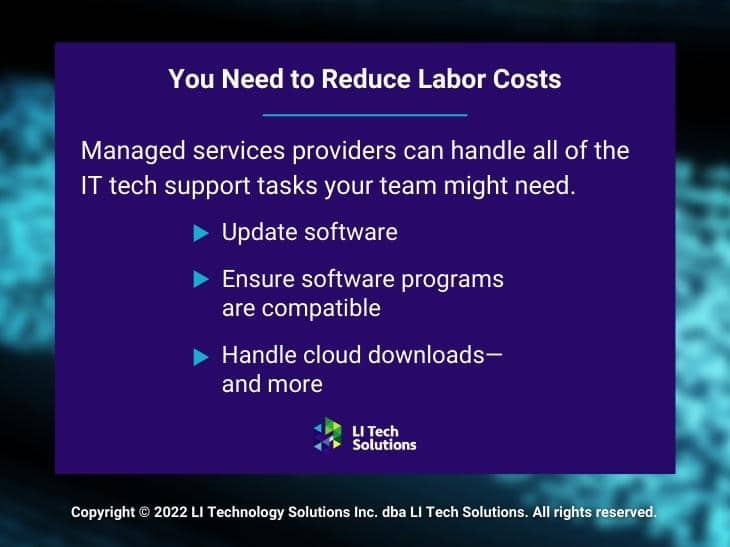
Even better, managed IT services providers can handle all of the IT tech support you might require. This includes updating software, ensuring that software programs work well together, handling cloud downloads, and more.
Similarly, you should outsource IT support for your enterprise if you need to reroute the work hours of your current employees to other goals. Say that it’s coming up on the busiest quarter of the year and you don’t want anyone on your team focusing on IT support tasks when they should be focusing on marketing, product creation, and so on.
You don’t have to hire completely new individuals to handle the increased workload. Instead, you can simply outsource your IT support needs to LI Tech Solutions.
Managed services providers can handle all of the IT tech support tasks your team might be used to. At the same time, you can then have your workers focus on what they do best, whether that’s making products, designing customer experiences, or creating effective marketing campaigns for future users.
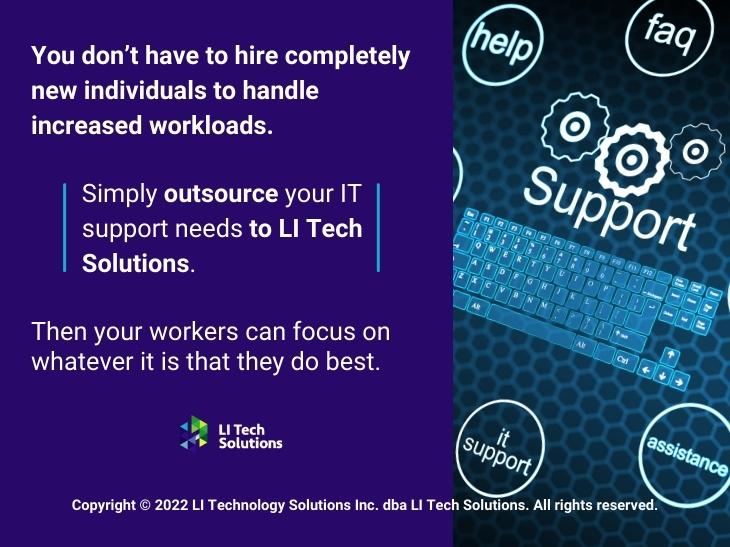
Technology always marches forward, and it seems that tech upgrades come out at breakneck paces these days. It can cost your business a lot of time and money to keep up with tech upgrades, especially all the patches that appear for security software and other major company applications.
In fact, tech upgrades are one of the number one sources of IT tech support tasks, and they’re a massive drain on your labor pool. If you don’t want tech upgrades to slow your business down, you can instead outsource those upgrade tasks to managed service providers.
That way, you can ensure that your software is always upgraded, up-to-date, and ready to go without having to divert important resources from your primary business objectives.
Speaking of primary business objectives, you might just want to focus your people more on your niche, specialty, or industry. That’s a fine business goal! Your small business can achieve it if you outsource your IT support needs to others.
Not only does this free up resources so your workers can focus more on their original tasks, but it also ensures your IT support work will be of a higher average quality.
When you leave IT support to the experts like LI Tech Solutions, you don’t have to worry about an employee accidentally downloading the wrong patch or causing a compatibility problem the day before a big software launch.
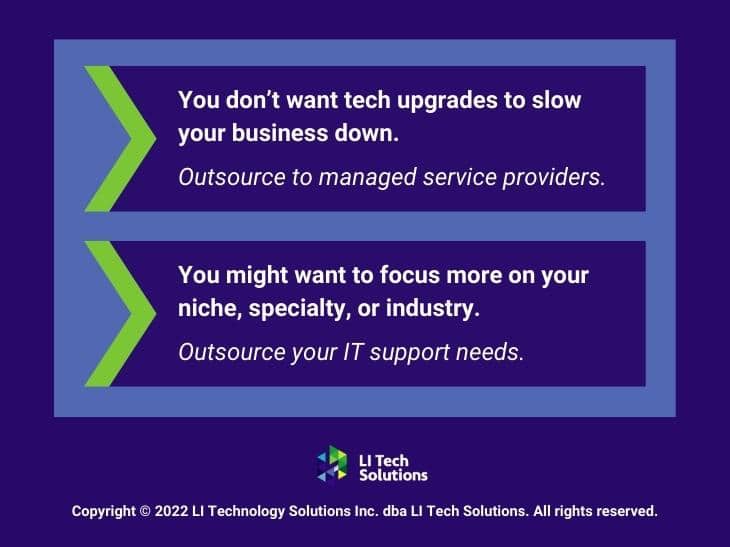
It’s also a good time to outsource IT support if you want to minimize business risk – and you should always want to do that! Given that some sources indicate that a data breach can total up to $4 million in damage, there’s no reason to leave your money and the trust of your customers up to chance.
Especially in light of legislation like the GDPR and CCPA, companies just like yours could face heavy fines and penalties if customer data is lost due to a malware attack. Even if you take steps such as installing antivirus software, you could still find yourself on the hook and your business floundering after a single breach.
Long Island managed IT services companies like LI Tech can provide you with the peace of mind and business stability necessary to achieve your long-term goals. With our help, you won’t need to worry about malware-related business risks sinking your corporate ship.
On top of that, managed IT services can provide you with the cybersecurity focus you’ve always wanted, but perhaps haven’t been able to achieve in the past.
To maintain top-tier, 24/7 cybersecurity protection, you need trained professionals working around the clock, constantly checking your business systems, and monitoring for malware attacks. That’s a lot to demand, especially if your workforce is already stretched thin.
Managed IT services can shoulder this burden for you by:
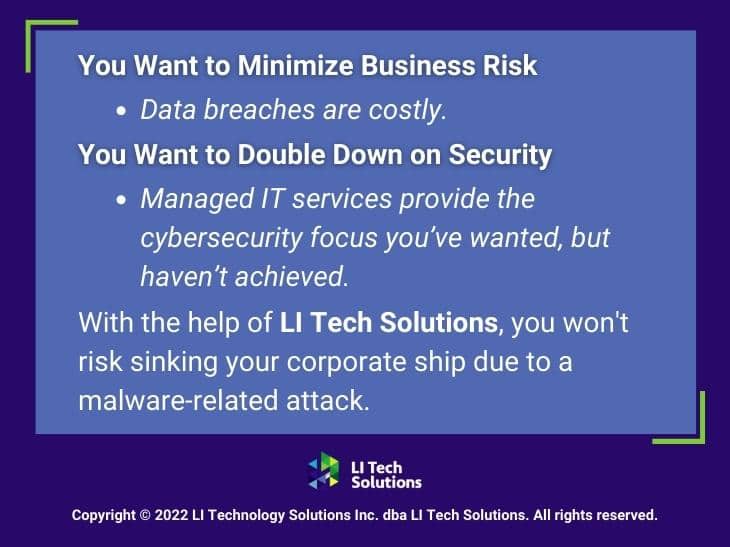
This is doubly true when you contract LI Tech Solutions. As committed managed cybersecurity providers, we’re well trained in data protection, security monitoring, and other cyber-safety best practices. We can even offer training for your staff, so they know how to avoid cyber threats, such as phishing emails or vulnerable public servers.
At the end of the day, any and all of these signs could indicate you need a quality managed IT services Long Island company. With our many years of service and dedication to other Long Island clients, LI Tech Solutions is the best choice for small businesses just like yours. Contact us today.
Modern computer systems are incredibly complex. Even individuals with lots of IT experience know that security breaches slip through the cracks all the time. Nowhere is this more apparent than in the latest Microsoft CVE-2022-30190 diagnostic tool vulnerability.
This vulnerability was only recently discovered. Fortunately, no major breaches or security disasters have occurred due to it so far. That said, your organization needs to know how to close this vulnerability – and how to prevent future cybersecurity breaches from affecting you in the future.
CVE-2022-30190 refers to a recently discovered vulnerability in the Microsoft Support Diagnostic Tool or MSDT. This is potentially dangerous since many organizations use the MSDT regularly to identify issues with their software or computer systems.
In other words, the CVE-2022-30190 MSDT vulnerability allows hackers far greater access to computer systems than they would normally receive. As a result, many managed security services providers, like LI Tech, have worked quickly and effectively to find and apply solutions.
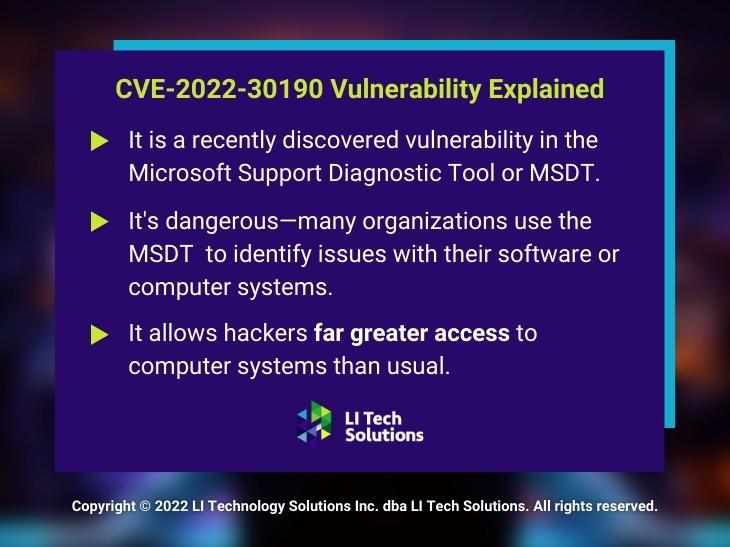
Currently, there is a Microsoft-endorsed workaround for the CVE-2022-30190 vulnerability. It operates by disabling the MSDT URL protocol.
By disabling the URL protocol, troubleshooters cannot launch as links, including links that launch through the operating system (OS). Note that troubleshooters may still be accessed by computer operators using the Get Help application or through standard system settings. Other troubleshooters may also allow troubleshooting access.
Once applied, the MSDT troubleshooter may not be launched through standard means, and the vulnerability should be closed until a longer-term solution is discovered and implemented.
In both cases, replace “filename” with the file you wish to troubleshoot.
For more information about this workaround and the CVE-2022-30190 vulnerability, visit Microsoft’s official page.
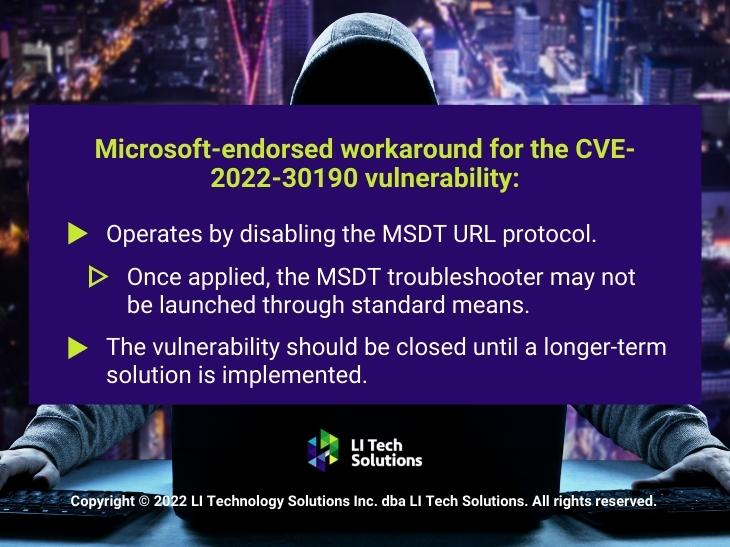
Although the above workaround is very beneficial, it does not solve the CVE-2022-30190 vulnerability in the long term. The only way to solve these vulnerabilities is to ensure that you have IT staff on hand constantly scanning for potential problems and closing breaches before they become issues.
That’s a tall order, especially if your business focuses on another industry or niche aside from IT security. But what if you didn’t have to assign people to do this critical task themselves?
Instead, you can rely on experts in IT security and managed software services: LI Tech Solutions.
As the go-to managed IT services provider in Long Island for many companies, LI Tech is well equipped to assist with your security and vulnerability patching needs.
In fact, we’ve already got on top of the CVE-2022-30190 vulnerability. As soon as it was announced, our experts got to work:
To the benefit of our clients, we rapidly applied a patch to close the vulnerability. We did this after confirming that none of our clients had suffered data losses or other security breaches due to the CVE-2022-30190 vulnerability in the first place.
That’s because, as a dedicated Long Island-managed IT services company, LI Tech is proactive compared to reactive. What does this mean?
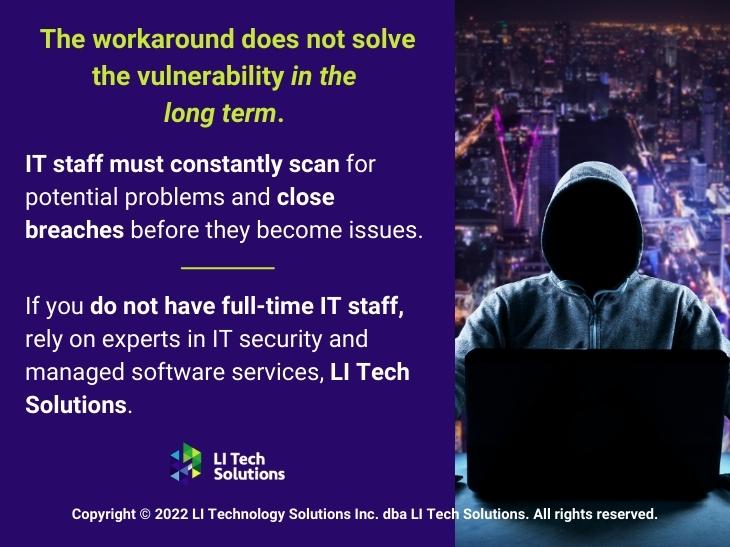
In short, our proactive approach allows us to identify and solve security issues before they negatively affect our client companies. We prioritize developing new approaches to security problems and evolving alongside malware and other cyber threats rather than letting those malicious parties set the pace of the digital arms race.
In contrast, a reactive approach usually leads to much higher costs in the long run. Companies must first become aware of security breaches, oftentimes after the damage has already been done, and then patch those breaches after the fact.
LI Tech’s proactive approach is exactly why you should rely on us to patch the CVE-2022-30190 and similar vulnerabilities for your company in the future. Instead of waiting for official Microsoft recommendations or trying to discern the right course of action yourself, why not leave it to the experts?
Even better, when you hire LI Tech Solutions, you don’t just get vulnerability patching. You also receive expert assistance and services like:
Ultimately, the CVE-2022-30190 vulnerability demonstrates the importance of having managed services providers working around the clock for your organization. To make sure your company doesn’t suffer any adverse effects from the CVE-2022-30190 vulnerability, contact LI Tech Solutions today.
Every business needs to be prepared for the worst. It’s not enough to have a simple data backup app for your servers or customer data. You need to have a detailed disaster recovery plan and business continuity plan ready to go if disaster strikes.
In addition, it’s often wise to practice business continuity transformation. By constantly improving and evolving your business continuity plan, your organization will be better equipped to handle new cyber threats on the horizon.
But that’s a lot of responsibility and work, especially for smaller organizations that may not have the manpower to focus on all of these elements. Fortunately, managed IT service providers in Long Island can provide your enterprise with the disaster recovery and business continuity transformation services you need.
Business continuity means ensuring that your business’s operations remain stable and available to customers during a disaster or IT issue. A good business continuity plan includes several key components:
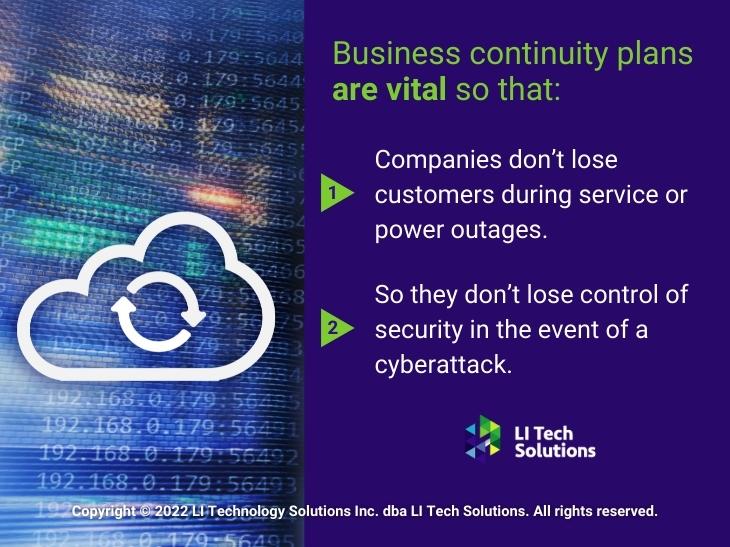
Business continuity plans are vital so that companies don’t lose customers during service or power outages and so they don’t lose control of security in the event of a cyberattack.
Business continuity transformation means applying new techniques, technologies, and strategies to expand your enterprise’s ability to stay operational in a crisis.
More specifically, business continuity transformation means improving your current continuity plans. In this way, you can optimize your public-facing performance even if your company is currently backing up data, recovering from a cyberattack, or handling some other disaster.
The IT and cyber threat landscapes are constantly changing. It can be challenging for enterprises to always be innovating with their business continuity plans and procedures when they’re focused on so many other aspects of business operations.
Disaster recovery plans emphasize restoring data access and security and ensuring the stability of IT infrastructure in the aftermath of a disaster.
In other words:
Disaster recovery is also vital because many cyberattacks target vulnerable consumer data or valuable enterprise systems. Having a recovery plan in place may allow businesses to:
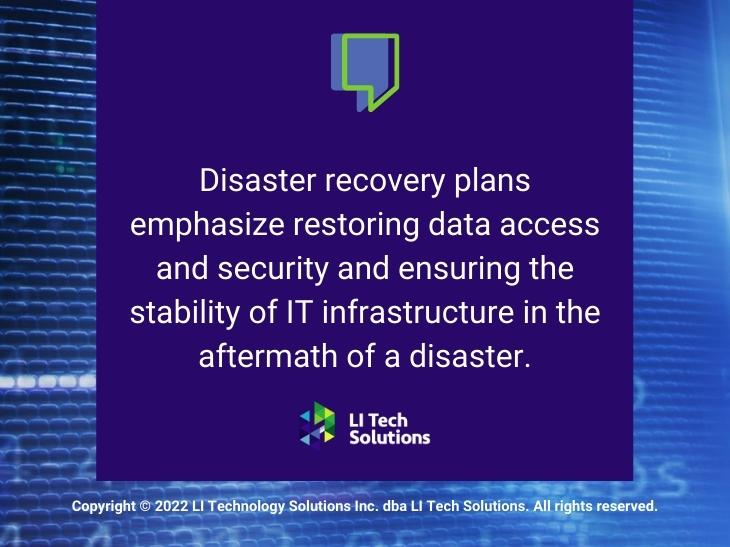
Just like disaster or emergency plans for real-world crises, disaster recovery planning and leadership is also important for IT disasters. The best disaster recovery plans include:
However, even the best disaster recovery plans are only successful under the right leadership.
Organizations should ensure that at least one individual is placed in charge of disaster recovery planning and implementation. When a disaster strikes, that individual can quickly give orders and marshal security measures without unnecessary deliberation.
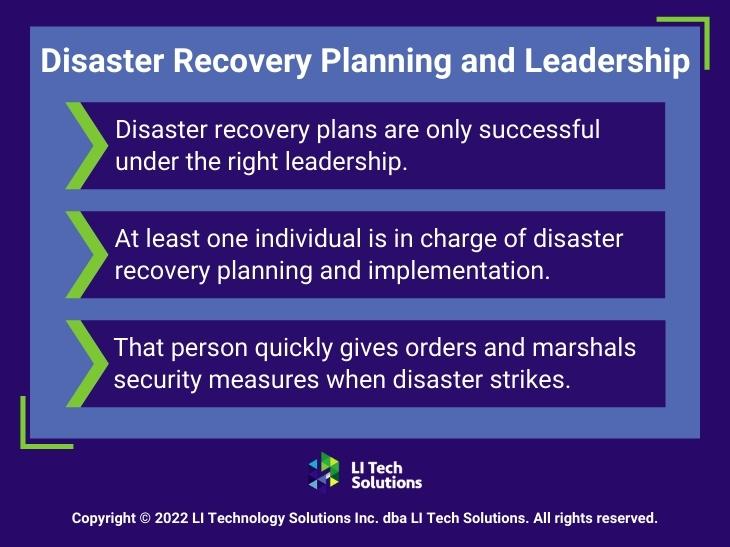
Managed service providers offer a wide range of benefits for companies just like yours. They can also provide specific advantages for business continuity planning and transformation, as well as disaster recovery procedures.
For example, managed service providers like LI Tech Solutions offer BCT or business continuity testing. This can provide your employees with key insights into their preparedness for potential disruption.
When you hire LI Tech, our cyber experts will help your team find good solutions for potential disasters, discover how to maintain services in the wake of a crisis, and much more. Plus, a managed service provider in Long Island, NY can help you run regular business continuity tests without interrupting your core business operations.
Disaster recovery plans are only worthwhile if you can implement them properly. That’s easier said than done, especially if your employees are not properly trained on how to do so.
Managed service providers can implement your disaster recovery plans to the letter, ensuring that data is backed up properly, that IT infrastructure comes online in the right order, and that security is restored at the earliest opportunity.
As experienced disaster recovery experts, LI Tech Solutions can provide end-to-end data security encryption. This flexible safeguard is perfect for any data environment, whether your business relies on cloud servers, hybrid servers, on-premises servers, or virtual servers.
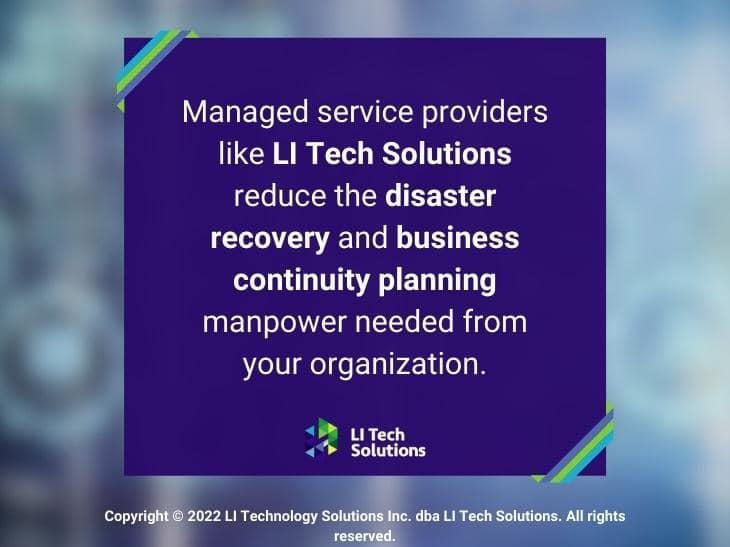
Perhaps most important of all, managed service providers reduce the disaster recovery and business continuity planning manpower needed from your organization.
When you offload the burden of these procedures to a trusted managed service provider, your employees can instead focus on other elements of your business. You can prioritize delivering great experiences and products to your customers without having to worry so much about IT security.
Instead, your managed IT services provider can tackle the tough elements of disaster recovery and business continuity planning/transformation.
No matter your business’s size or focus, LI Tech Solutions offers the best managed IT services in Long Island. Our data protection solutions, business continuity planning and testing, and other services allow us to provide your business with the support it needs to anticipate and overcome disasters in the future. Contact us today for more information!
The hybrid workplace isn’t going away. The hybridization of many industries was already a growing trend prior to the COVID-19 pandemic. But the pandemic solidified that trend into a full-blown economic revolution.
In many industries ranging from tech to finance and more, hybrid workplaces allow employees to work remotely some of the time and in the office the rest of the time. The benefits are numerous, ranging from increased worker flexibility to reduced resource consumption and more.
However, hybrid workplaces can be even more beneficial for your organization when you employ managed services providers like LI Tech Solutions. Let’s take a look at five key ways that MSPs can support hybrid workplaces just like yours.
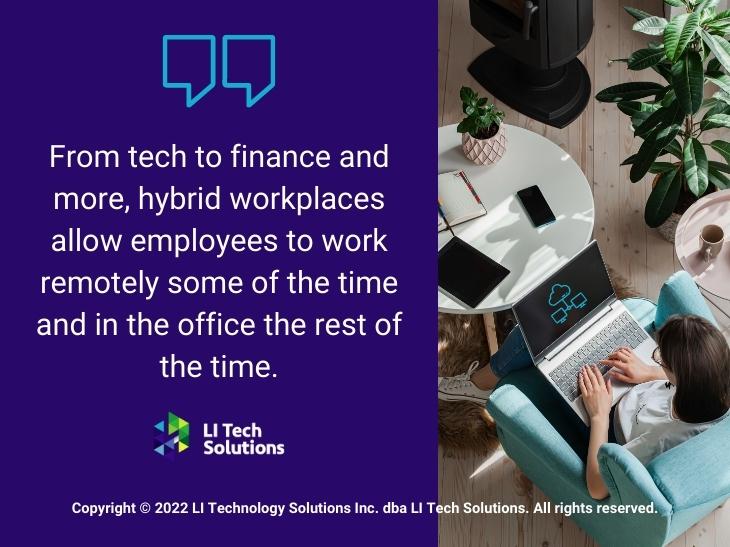
For starters, managed service providers can offer excellent cloud infrastructure and ongoing support. Cloud infrastructure, software, and other services are most important for hybrid workplaces.
Why? Because through the cloud, organization employees can access the same resources, use the same software, and use all the same files whether they work from home or at the office. Cloud access means that all employees can work together no matter where their computers or end terminals happen to be.
Of course, it takes a dedicated IT team to manage cloud infrastructure and offer 24/7 support. That’s where a managed services provider comes in.
MSPs can help your cloud infrastructure work for your company by:
On top of all that, managed services providers can ensure that your cloud resources scale with your organization. Therefore, if you want to stick with a hybrid workplace over the next few years, your cloud infrastructure can grow with your company. An MSP can make that future a reality more easily than ever.
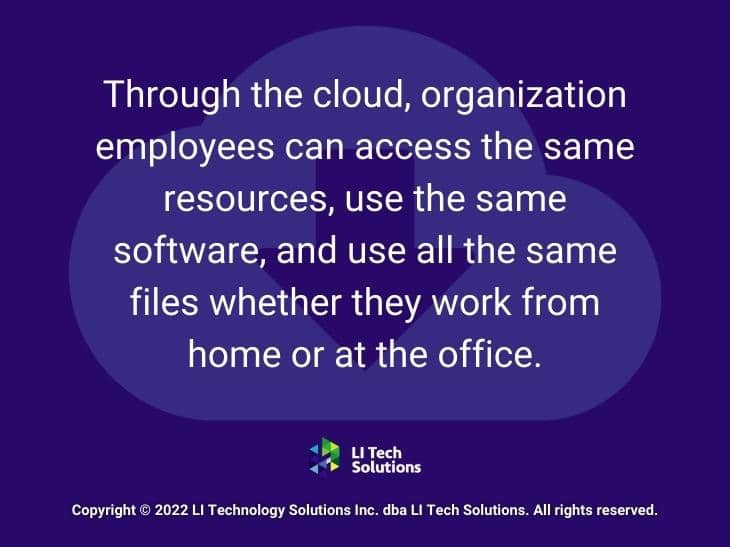
Perhaps more importantly, managed services providers can offer regular security updates for important antivirus and anti-malware measures. These include antivirus software like firewalls, phishing protection for company emails, and much more.
The cybersecurity landscape is always evolving, which means security updates must be implemented and installed as soon as they become available. But it can be tough to keep track of which programs or security software need updates. Your MSP can do all that for you, freeing up your people to work on other tasks.
In addition, MSPs like LI Tech offer 24/7 monitoring for your cloud infrastructure and company systems. This monitoring will ensure that you are alerted whenever there is a potential cyber breach and that cyber breaches will be much less likely to succeed.
In the event of a successful cyberattack, the monitoring from a managed services provider will help you prevent it from occurring in the future.
Of course, many cybersecurity breaches occur because of employee mistakes. To that end, MSPs such as LI Tech Solutions offer security training for your employees. These training seminars can teach the basics of good digital hygiene, like how to build strong passwords and how not to log workplace computers via vulnerable public networks.
10 Things to Consider Before Hiring an IT Support Company in Long Island, NY
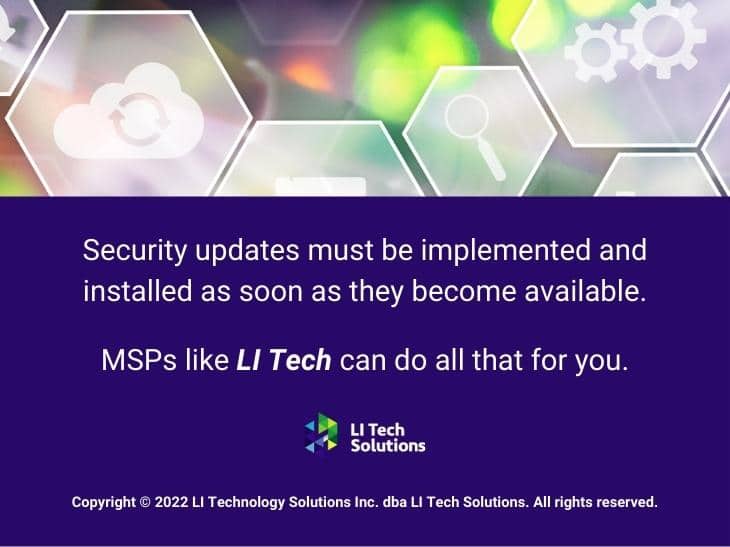
On top of all that, MSPs can provide crucial workforce analytics services for your growth and understanding. For example, MSPs can gather data about:
All of that data, once properly analyzed, can help you make better decisions for your company. Managed services providers can even help improve your data management and storage policies so they’re more efficient for your workers. This will improve productivity for your hybrid workforce.
Any manager or executive who oversees a hybrid workforce knows the difficulty of ensuring that all employees are on the same page. Project management becomes a little more difficult when employees work from different places, despite all the other benefits associated with allowing a hybrid workplace.
However, managed services providers can offer project management and organizational services, or connect you to project management software via the cloud. Either of these solutions will help your remote and in-office employees collaborate just as efficiently in a hybrid workplace as they would in a traditional office environment.
Project management services and software help ensure that:
All of those benefits will make your hybrid workforce just as good as it was before you made the transition. MSPs support hybrid workplaces to help your organization’s productivity flow.
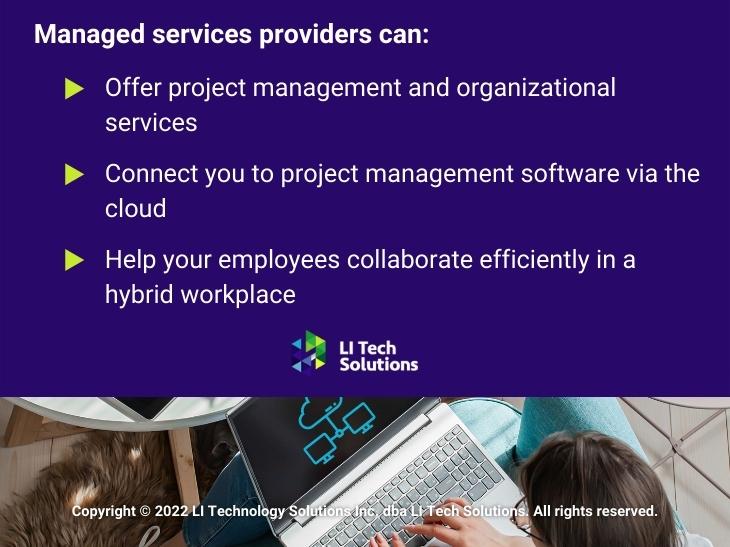
Lastly, MSPs can support your hybrid workplace by improving organizational productivity across the board. In effect, MSPs take a lot of the busy work or manual tasks of cloud support and cybersecurity away from your team.
Instead, your employees can focus on the core aspect of your business that net you the most profits. Imagine what you could do if your IT personnel could focus on building a new website or online marketing instead of having to monitor security 24/7.
In addition, MSPs support hybrid workplaces by providing value by overseeing your cloud infrastructure. In this way, your workforce can take advantage of the technologies of the cloud without having to continually update it and monitor it for stability.
Bottom line: by hiring an MSP, your hybrid workplace will enjoy greater operational flexibility. Your employees, meanwhile, can be reassigned to other elements of your business depending on what you need.
Ultimately, managed services providers are valuable for any companies that use hybrid workplaces. If you’ve decided to allow your workforce the flexibility and other benefits of hybridization, consider hiring an MSP for even greater improvements.
As a well-known managed IT services provider in Long Island, we’re well-equipped and ready to assist your hybrid workplace starting today. Contact us for more information!
Modern cyber security is more important than ever, but it’s also more expensive and resource-intensive. These days, many companies find it tough to maintain in-house IT or cyber security departments, especially if they aren’t focused on cyber security themselves. There may be an alternative solution: outsource your cyber security needs. Today, let’s break down the benefits of outsourcing cyber security to managed service providers like LI Tech Solutions.
For starters, outsourcing your cyber security may lead to more predictable – and therefore manageable – costs for online security. When your in-house team handles cyber security, they’ll produce bills sporadically for things like software updates, training the team on new initiatives, and for purchasing new security products.
If you pay a flat, regular fee to a managed service provider, your cyber security costs are more predictable. For smaller companies or organizations whose budgets are already thin, this can be a major benefit.
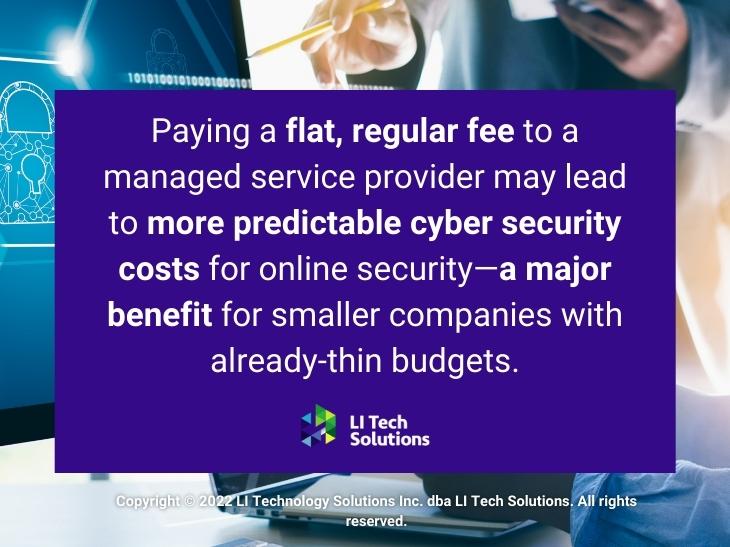
Furthermore, outsourcing your cyber security needs to a managed service provider may help you benefit from more regular security updates and improvements.
Malware evolves constantly, so security efforts must also evolve in tandem with cyber threats. This is often accomplished through updates and patches. But it can be tough for your team, especially if they have other things to juggle, to remember these updates and shore up your cyber defenses regularly.
A managed services provider will ensure that cyber security software is updated when needed and improvements are implemented ASAP. In this way, your business will use the most appropriate digital security at all times. But your team won’t have to worry about it since these concerns will be handled by your managed services squad.
By freeing up that manpower in your team, you’ll be able to refocus the extra productivity on other elements of your business, including product design and development, marketing, or something else entirely. It’s up to you!
That refocused productivity can save you a lot of money in the long run, and may also lead to increased profits later down the road. Refocused productivity is crucial for startups that have small teams. For example, if your organization only has 50 people, can you really afford to have 10 of them dedicated to IT security 24/7?

Instead, outsourcing your cyber security needs to a managed service provider allows everyone on your team to be focused on your business goals. You can still rest assured that your cyber security needs will be taken care of.
Managed services providers employ experts in the field. In most cases, you will find that the cyber security results from a managed services provider are superior to what you can produce with your own, in-house team.
Speaking of IT security 24/7, managed services providers offer maintenance and security responsiveness 24 hours a day, seven days a week. Even if the rest of your team is out of the office, your managed services provider can:
This, in turn, allows you to ensure that your staff enjoys a manageable schedule and that someone doesn’t have to be on hand at midnight to oversee a security patch. Plus, 24/7 security oversight means that malware or other digital attacks will be less likely to succeed and breakthrough digital defenses.
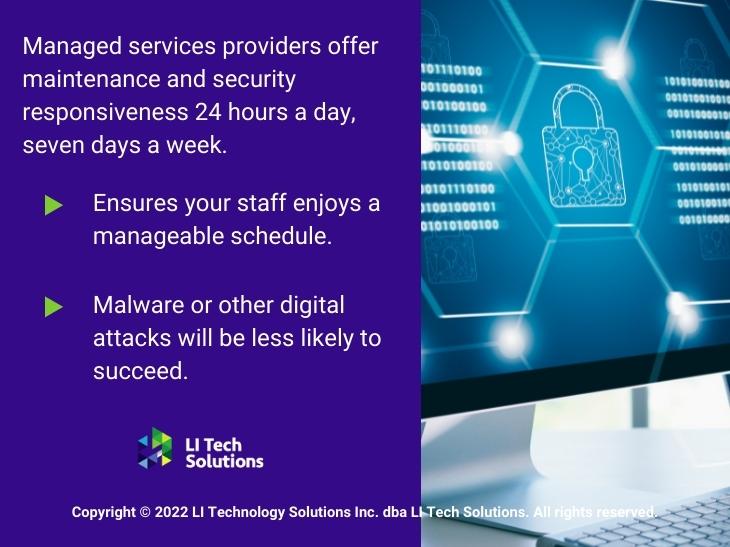
As your business grows, IT security scalability will become a more important concern. After all, the more business architecture you have and the more files you need to protect, the more robust your cyber security efforts need to be as well.
Fortunately, outsourcing your cyber security efforts to a managed services provider means scalability comes with the package. As your resource needs grow, your managed services provider will update your software, offer new security measures, and assign more people to your business.
One of the big benefits of outsourcing your cyber security needs is improved cyber security results. As your managed services provider learns your business and the types of threats you encounter, it will:
In other words, the longer you stick with a managed services provider, the better security responses you’ll see across your organization. Remember, your business’s team can focus on other aspects of your organization all the while.
On top of that, managed services providers employ experienced IT security professionals. If your business is not focused on IT security or does something completely different, the security specialists from a managed services provider will be far and away better for intercepting and fixing security issues.
This is more important than ever, especially given the increased sophistication of modern cyber threats.
Digital Transformation in Healthcare: MSPs’ Role in Long Island
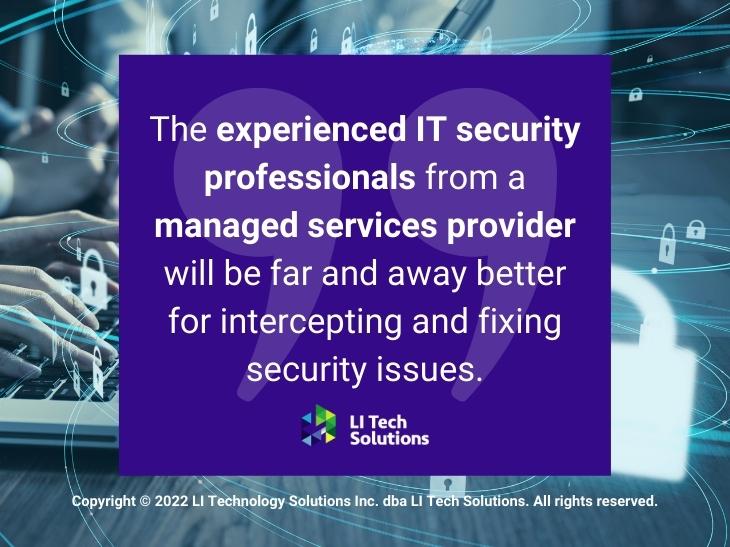
Perhaps most importantly, outsourcing cyber security also means outsourcing compliance with the CCPA, GDPR, and other current or prospective legislation. Many organizations need to be careful not to break these regulations, or else they may face heavy fines.
But compliance is an evolving thing. When you outsource cyber security, your managed services team will ensure that you always remain compliant regarding consumer data privacy and protection policies.
Ultimately, outsourcing your cyber security needs is a great choice, even if your company works in the IT industry. Giving cyber security responsibilities to a specialized, 24/7 team could be the best thing you can do for your budget, your team management, and your goals.
Fortunately, LI Tech Solutions offers expert cyber security protection. If you need managed IT services in Long Island, we can help. Contact us today for more information!
Modern enterprises want to take advantage of the unique benefits and conveniences offered by the cloud. However, you need to know how to secure a cloud environment for your company if you want to store and retrieve your data safely in the future.
Not sure where to start? Let’s break down some of the best practices for securing a cloud environment. Many of these practices are already leveraged by managed tech services such as LI Tech Solutions. But you can also implement these practices yourself.
For starters, any secure cloud system will have thorough encryption for all endpoints, including those for both users and corporate staff. Encryption scrambles important corporate or private data, preventing anyone who scoops the data from being able to read it without an encryption key.
This is crucial because, whenever you use cloud services, you send data back and forth between a network in the cloud. Encryption helps ensure that the data stays safe and secure even while using cloud services regularly.
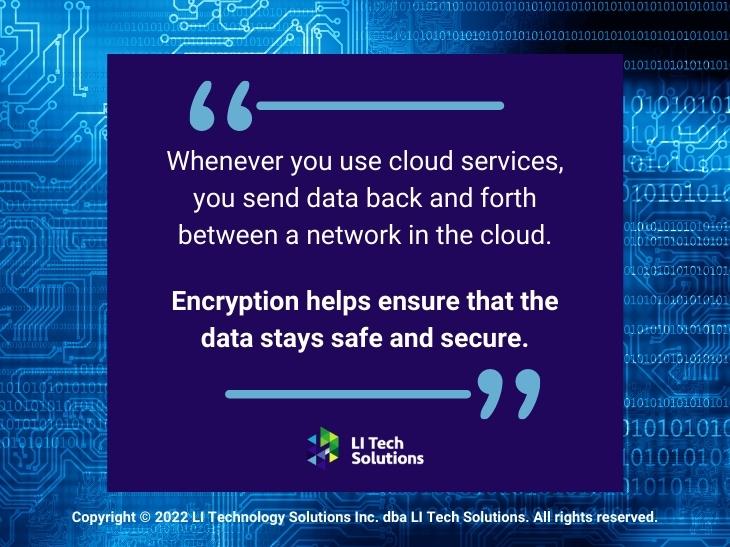
Similarly, companies need to secure user endpoints, such as mobile phones, desktops and laptops, and any other user devices. Endpoint security can range from antivirus software to fingerprint scanners and more.
Regardless, boosting endpoint security is vital since it reduces the likelihood of cyber breaches via employee computers. These are some of the easiest means for cybercriminals to get access to company data, so organizations need to make it tougher for them.
Of course, picking the right cloud services provider is also key to enjoying a secure cloud environment. Different providers will emphasize different security techniques or bring different technologies to the table.
For example, LI Tech Solutions has a detailed list of security best practices for cloud environments, such as two-factor authentication processes and cloud security awareness training. That’s one reason why LI Tech Solutions is the go-to choice for Long Island managed services.
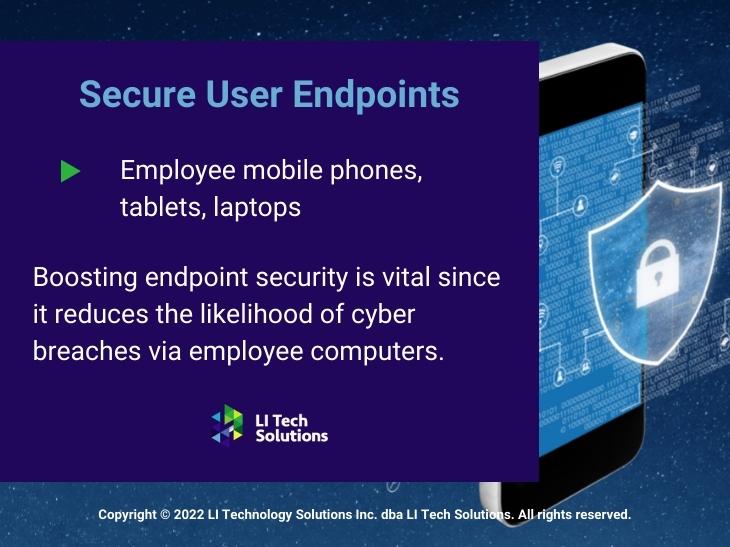
But corporate executives can also take security into their own hands. For example, you can write a detailed list of usage policies for all members of your organization. These usage policies will break down:
Defining usage policies is important since it prevents employees from making simple mistakes or from breaching security protocols unknowingly. Once your policies are defined, you can teach employees the right way to use your cloud network or fire employees who fail to abide by security standards.
Employee knowledge is further highlighted with digital hygiene. Digital hygiene includes:
Corporate executives should regularly hold digital hygiene seminars to make sure their employees are always kept abreast of updated digital hygiene protocols. Practicing digital hygiene is important for everyone in your company, so make sure that you know how to practice it as well!
Business executives should also maintain strict control of data transfer and access privileges between the company network and the cloud servers. Specifically, you should write down a set of data control and access policies for your entire corporation/team.
These policies will:
In general, it’s wise to only give these privileges to certain trusted individuals. That way, there are fewer opportunities for malicious actors to get access to sensitive company data.
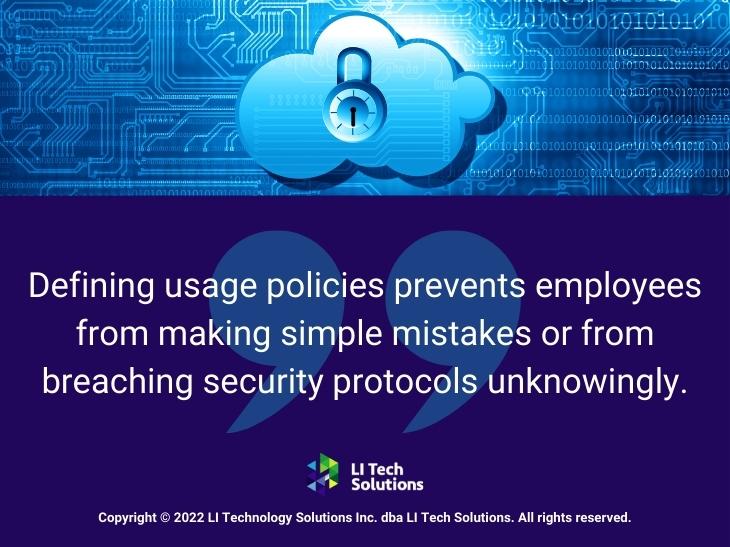
Naturally, malware protection for your company servers and your cloud access points is just as important as it is for everyday computing or Internet surfing. Anti-malware software and tools are very important, especially because malware viruses are constantly updating and evolving.
Luckily, many managed service providers already include malware protection by default. But even if you don’t have a managed service provider, you should implement malware protection for your cloud services ASAP.
Security logs are important tools to help you determine what the security vulnerability was after a breach or security malfunction. Security logs:
In some cases, security logs may even help you update or upgrade your security measures before a major attack occurs. Make sure your IT security team or managed services provider has security logs enabled from the start.
Speaking of audits and tests, your organization should run regular security checks and audits to:
All of this can help prevent an attack from occurring in the first place, which is always cheaper than recovering from a cyber-attack after the fact.
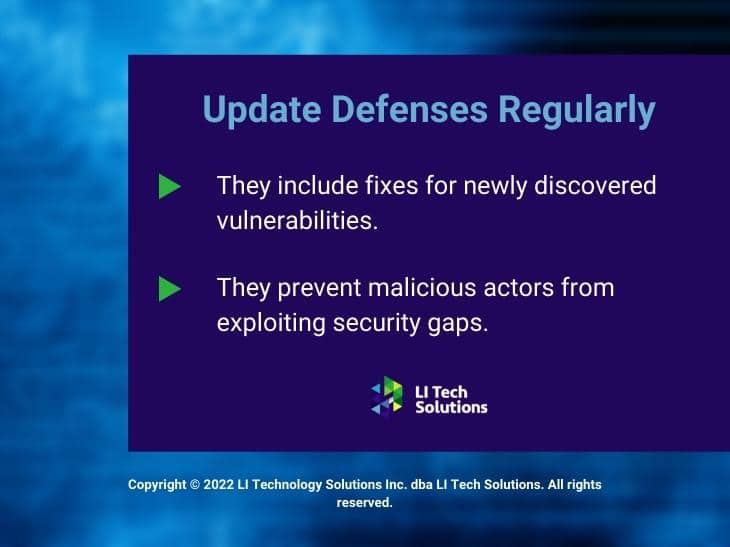
Lastly, anyone using a cloud environment should update their antivirus and other defenses regularly. Updates are important because they include fixes for newly discovered vulnerabilities and because they prevent malicious actors from exploiting security gaps.
If you have a managed services team running your cloud services, they should include software and network updates as part of their packages.
Of course, you can make things easy for your organization by contacting LI Tech Solutions today. As experts in cloud infrastructure and managed services, we’re well equipped and ready to provide your organization with reliable access to a secure cloud environment for all of your data storage needs.
Why wait? Contact LI Tech Solutions today!
Over the last few decades, technology has been a driving force in business transformation and doesn’t show any signs of slowing down. The fact that direct digital transformation investments are projected to total $7 trillion between 2020 and 2023 demonstrates this.1 If you want your firm to succeed, you must have the appropriate technologies to help you keep up with the changing business world. Let’s take a look at the tech trend predictions for 2022.
In the present scenario, your technology must enable you to overcome three recent pandemic-induced issues:
In 2021, supply chain interruptions cost businesses throughout the world an average of $184 million.2
In September 2021, 4.4 million people resigned from their jobs in the United States alone, setting a new record.3
Ransomware affected 68.5% of businesses in 2021.4
Businesses must keep up with the demands of the evolving technology landscape if they wish to achieve their goals and remain competitive despite the changes brought about by the pandemic.
Track the latest technological trends to know if you are moving in the right direction. Having a managed service provider (MSP) on your side allows your business to stay up to date without you having to do much heavy lifting.
In 2022, third parties will be involved in 60% of security incidents. This means that firms that fail to invest in the risk management trifecta of people, processes, and technology may face cyberattacks.
Proactive businesses will include risk assessment, supply chain mapping, real-time risk intelligence, and business continuity management in their IT stack (rather than a single application like Excel).
To successfully and securely empower remote workers, organizations need to deliver:
However, a third of the companies still lag in these areas.
Cloud customers will change their business strategy to be completely cloud-native rather than using the cloud for only a portion of their portfolio.
Also, cloud-native adoption is predicted to reach 50% of enterprise organizations by 2022, spanning all major technology domains such as big data, artificial intelligence, and the Internet of Things.
In 2022, technology executives will concentrate on fixing long-term problems. The best will embrace a customer-centric approach to technology, allowing their organization to quickly reconfigure business structures and capabilities to meet future customer and employee needs with adaptability, innovation, and resilience.
If you are in NYC or Long Island and want to get your technology infrastructure ready for a successful year, you’ll need the help of a dependable managed service provider (MSP). Feel free to contact us to set up a free consultation. Our expertise and skillsets may be precisely what your company needs to help remote workers thrive.
Sources:
The cloud computing revolution has just begun, but it’s already driven major changes in industries ranging from tech to finance to healthcare and more. This article covers five of the biggest benefits of cloud computing for your business.
Despite its widespread adoption, some companies still haven’t transitioned to cloud computing. Often this is because they don’t understand how they could be benefiting from this new way of storing, retrieving, and using data.
Still not sure how your business could benefit from cloud computing? Find out the advantages of working with a cloud computing service today and the benefits it brings.
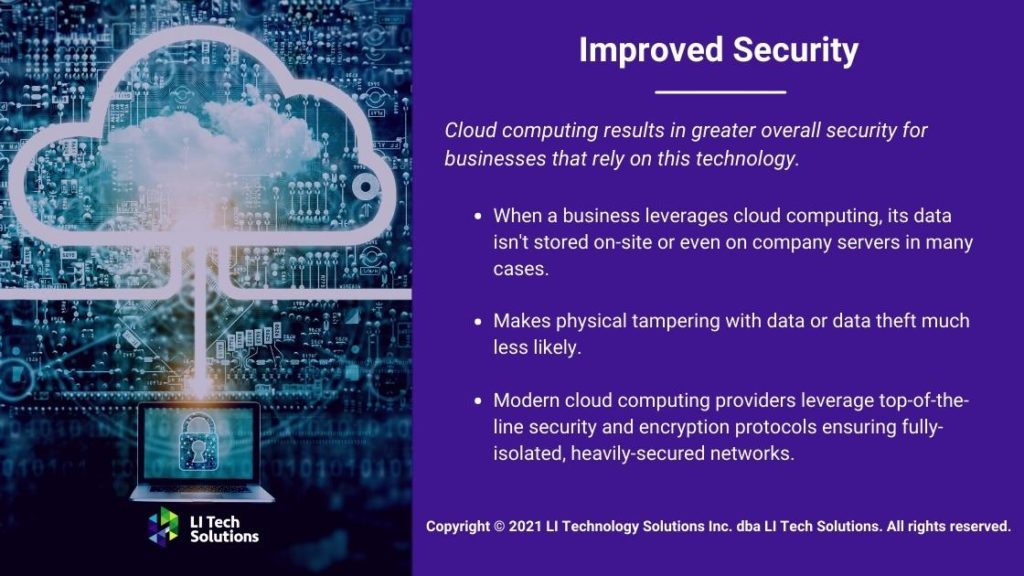
Perhaps the most important benefit overall is boosted security. This is especially crucial due to the modern legal requirements facing international companies (see below).
When a business leverages cloud computing, its data isn’t stored on-site or even on company servers in many cases. Instead, it’s stored on cloud servers hundreds or thousands of miles away.
This increases security because it makes physical tampering with data or data theft much less likely. For example, a business that uses cloud computing for data storage or processing isn’t at risk of a disgruntled employee using a stolen ID card to access and wipe company servers.
Furthermore, modern cloud computing providers leverage top-of-the-line security and encryption protocols to ensure that their networks are fully isolated, heavily secured, and include redundancy protocols.
These benefits of cloud computing for your business result in greater overall security for businesses that rely on this technology.
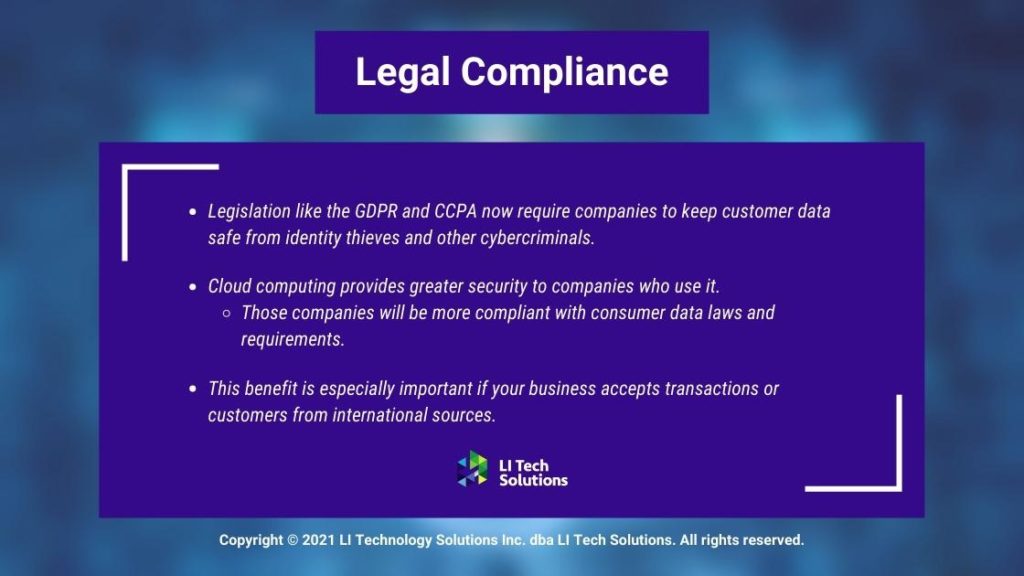
As touched on above, the modern legal environment is evolving quite fast. Legislation like the GDPR and CCPA now require companies to keep customer data safe from identity thieves and other cybercriminals.
Companies’ abilities to do this are directly affected by their overall security. A low-security company may be the victim of one or more cyber breaches. This causes their customer data to leak onto the wider web.
This may lead to excessive fines, loss of customer trust, and other major fallout from a single bad firewall or unprotected password.
In contrast, cloud computing provides greater security to companies who use it. Those companies will be more compliant with consumer data laws and requirements.
This benefit is especially important if your business accepts transactions or customers from international sources. Even in the US, legislation like the CCPA could become commonplace across states, making increased security a requirement rather than an optional inclusion.
Cloud computing offers a major practical benefit for businesses: faster and easier updates or setups for computer systems.
Cloud service providers address automatic updates, maintenance, and setup needs for their servers, software, and other products. That’s less work that a company has to do and fewer hours you have to dedicate to these tasks.
On top of that, cloud computing providers are continually improving structure with software development and hardware upgrades. They do this to maintain a competitive edge against other cloud service providers.
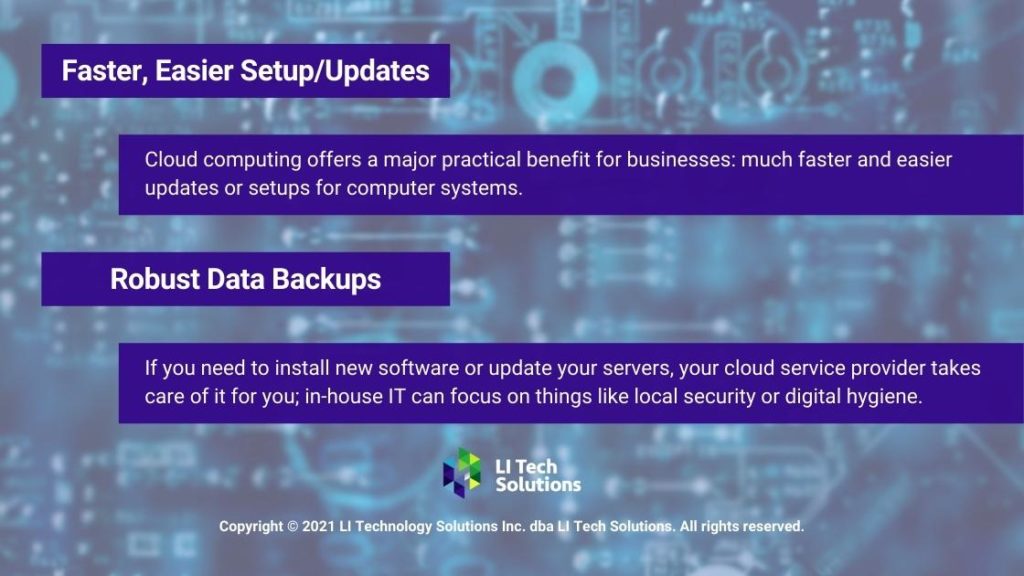
But your business benefits from this competition. If you need to install new software or update your servers, your cloud service provider takes care of all of it for you. Your in-house IT team can focus on other aspects like local security or digital hygiene with your employees.
This benefit is present even if you use hybrid cloud setups, which include private and public clouds. These cloud setups provide on-demand services but are also much easier to update, especially regarding security patches and new software functions.
Even the best servers may crash from time to time, and the second-worst thing after having your website crash is having all of your data wiped at the same time.
Cloud computing provides a convenient solution to this possibility: remote data backups that occur on a weekly or daily basis. You won’t have to take care of these data backups because your cloud service provider will do it for you.
These data backups ensure that, even if your site does crash (either because of a glitch or because of a targeted attack), you’ll be able to get it back up and running more quickly than average. Furthermore, you won’t lose sensitive data to the ether.
Automatic backups are absolutely a necessity for any company that collects customer data for their marketing or other purposes. With cloud computing, you don’t need to worry about having physical backups on-site; remote backups will always be available around the world.
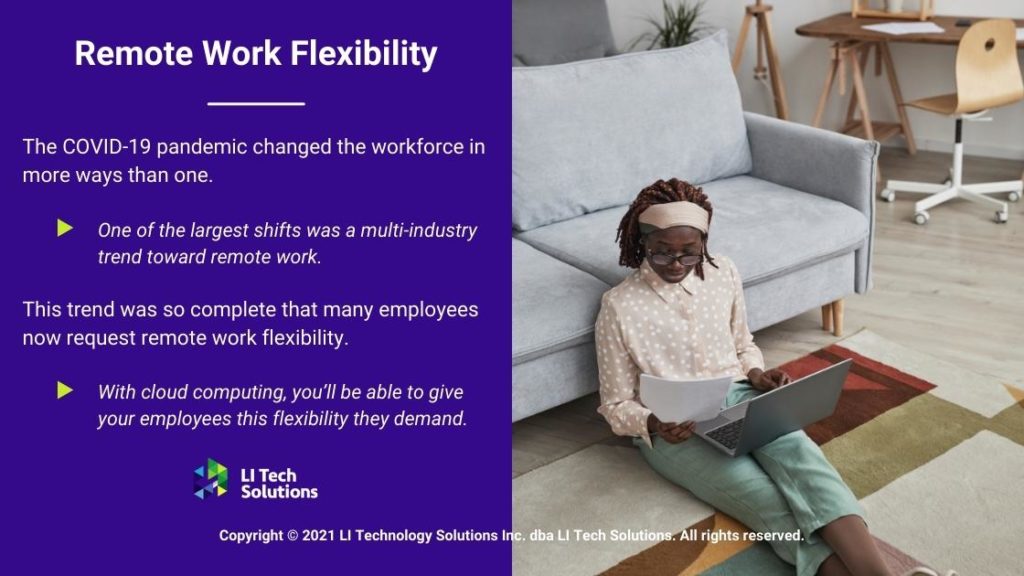
Cloud computing may benefit your business because of how it lends itself to remote work and schedule flexibility.
The COVID-19 pandemic changed the workforce in more ways than one. But one of the largest shifts was a multi-industry trend toward remote work, particularly for white-collar professions.
This trend was so complete that many employees now request remote work flexibility, even if they can technically return to office environments.
With cloud computing, you’ll be able to give your employees this flexibility they demand without having to compromise on tasks or production quotas.
Cloud computing allows employees and administrators alike to access sensitive company data through encrypted channels anywhere in the world with an Internet connection. Your employees can do just as much work at their homes or elsewhere as they could in your office.
While this improves the morale of your employees, it may also save on costs. Some companies are even transitioning out of large office complexes in favor of smaller or coworking spaces since no one uses the traditional spaces they pay for.
In the end, cloud computing is simply too advantageous for businesses for you to ignore.
Fortunately, your business can start enjoying the benefits of cloud computing with providers like LI TECH. We offer four different types of cloud computing services, ranging from private clouds to public clouds and more.
We provide a variety of cloud computing services and utilities to give your staff members ultimate flexibility, security, and productivity. Contact us today for more information.
Small and Medium Businesses (SMBs) usually invest less in cybersecurity, making them easier targets for cybercriminals. Close to 30% of businesses experience a cyberattack at least once per week. This article looks at why and how to implement a cyber resilience strategy for your business.
1-The need for constant vigilance and defense against hackers has led many SMBs to complicate cybersecurity matters. Though the percentage of businesses that have adopted formal, business-wide incident response plans has increased from 18% in 2015 to 26% in 2020, the ability to contain an actual attack dropped by 13%.
2- This is because: (a) businesses do not consistently test threat-readiness of incident response plans and (b) many of them use too many security products that hamper the ability to identify and respond to a cyberattack.
It is here where a cyber resilience strategy can help organizations protect uptime and recover from incidents faster. Some people use the terms cybersecurity and cyber resilience simultaneously, but the meanings are different.
While cybersecurity primarily aims at blocking nefarious cyber players from attacking your network, cyber resilience is more about planning, defending, responding to and recovering quickly from a cyberattack. Endpoint protection, email security, network security, backup and data recovery, identity and access management and a host of other critical solutions together fuel a comprehensive cyber resilience strategy.
The cyberthreat landscape is evolving at lightning speed and traditional security measures cannot keep up with it. Experts have predicted that a ransomware attack will occur every 11 seconds in 2021. The only way forward for businesses, including yours, is to draft a cyber resilience strategy that highlights ways to move forward in the face of a cyberattack.
Your business is cyber resilient when:
The major components of a cyber resilience strategy are:
By deploying efficient attack surface management and risk management, you can easily take your business through the path of cyber resilience. Doing so helps you minimize first-party, third-party, or fourth-party risks that arise because of data leaks, data breaches, or misconfigurations. Additionally, assessment reports identify key risk areas that require attention.
Cybercriminals are shapeshifters who constantly change their devious tactics. Ensure your business can adapt to emerging cyberthreats.
To quickly bounce back after a security incident, your business must have all the necessary infrastructure, including robust data backups. Conducting mock drills that let you understand the employee readiness to counter cyberattacks is also important.
Your IT team can improve the business’ durability through constant system enhancements and upgrades. No matter what strategy the criminals use, prevent their actions from overwhelming you through shock and disruption.
Adopting cyber resilience proves beneficial before, during, and after cyberattacks. Five ways it protects SMBs:
1. Enhances system security, work culture, and internal processes
By implementing a cyber resilience approach within your business, you can easily design and develop strategies tailor-made for your existing IT infrastructure. Additionally, it improves security within each internal process, so you can communicate desired behavior to employees.
2. Maintains business continuity
Cyber resilience ensures that operations are not significantly affected and business gets back to normal after a cyberattack.
3. Reduces financial loss
The financial damage caused by a breach can be so severe that businesses go bankrupt or even close. This resilience strategy keeps threats in check, reducing the chances of business disruption as well as limiting financial liabilities.
4. Meets regulatory and insurance requirements
It helps keep your business out of regulatory radars by satisfactorily following all necessary criteria. Also, complying with regulations can be beneficial to your business for cyber insurance claims.
5. Boosts company reputation
Having cyber resilience by your side gives you better control in the event of a successful cyberattack. It helps you block attacks, bounce back quickly if an incident happens and minimize the chaotic aftereffects of a breach. This improves your business reputation among partners and customers.
Don’t worry if the concept of cyber resilience is tough to crack. We can guide your business to and through this strategy. Start with an assessment to check your business’ cyber resilience level.
Li Tech Solutions offers innovative managed IT services to clients in Long Island and Brooklyn.
Article curated and used by permission.
Sources: